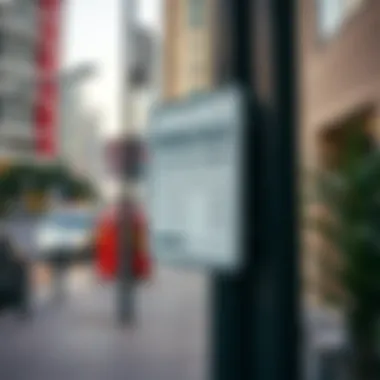Understanding Parking Regulations and Timings in Dubai


Intro
Navigating the vibrant streets of Dubai often requires a keen understanding of parking regulations and timings. In a city where the pace is fast and the population is diverse, the intricacies surrounding how and where one can park are vital for both residents and investors alike.
Parking is more than just a convenience; it underscores significant growth patterns and real estate dynamics in this bustling hub. This article takes a thorough look into the framework that governs parking, examining different facilities, operational hours, and regulations that vary across the city's districts. Whether you're a local or someone considering moving to this remarkable metropolis, knowing the parking landscape can enhance your experience and even guide your investment choices.
As we dive deeper, it becomes clear that parking is not just a mundane chore; it influences residential choices, commercial success, and even broader market trends. Let's begin by unpacking the current market conditions surrounding parking in Dubai.
Understanding the Parking Landscape in Dubai
Dubai's rapid growth has transformed it into a global city with bustling business districts, lively leisure spots, and residential enclaves. At the heart of this development, the parking landscape plays a crucial role in facilitating the urban experience. The efficiency and accessibility of parking not only enhance the quality of life for residents but also influence the way businesses and investors approach the real estate market.
The Importance of Efficient Parking Solutions
Efficient parking solutions are more than just a convenience; they are a necessity in a city where the number of vehicles continues to rise. Think of it like a well-choreographed dance — a smooth, organized system that allows everything to function without stepping on toes. Without proper management, traffic congestion escalates, pinching off avenues and creating havoc.
- User Experience: Easy access to parking means more people can visit shops, restaurants, and entertainment venues. Simple features like clearly marked spaces and intuitive payment options can make all the difference.
- Economic Activity: When parking is well organized, businesses benefit from increased foot traffic. Visitors are more likely to stop and shop if they can find a convenient spot to park their car.
- Reduced Congestion: An efficient parking regimen helps to alleviate traffic jams. If drivers spend less time searching for a parking space, they contribute to smoother traffic flow.
In Dubai, the integration of smart parking technologies is a game-changer. These systems can monitor space availability in real time, significantly improving the user experience. With everything from mobile apps to in-car navigation, it's easier than ever for drivers to locate a spot.
Impact on Real Estate Development
The implications of parking regulations extend to the very fabric of real estate development in Dubai. As investors scout potential properties, the availability and regulation of parking can sway decisions. Developers are increasingly mindful of how well their projects accommodate parking needs.
- Site Selection: Areas with established parking solutions often see a boost in property values. Accessibility can make a prime piece of land worth even more.
- Design Considerations: Developers are now considering parking layout in their designs. Multi-level parking garages have become a common sight, enabling the maximization of space while providing adequate facilities for car owners.
- Compliance with Regulations: Projects need to adhere to local regulations concerning parking counts, especially in bustling urban zones. A shortfall in available parking could deter potential buyers or tenants, impacting rental and resale values.
Real estate analysts recognize that a project's success is not just about aesthetics but also functionality. The core lesson is clear: a well-planned parking infrastructure can uplift property value and overall urban development.
Ultimately, as more people flock to Dubai’s thriving streets, understanding the nuances of the parking landscape becomes indispensable. Both current and potential stakeholders must engage with this essential aspect of city planning to unlock the full potential of their investments.
Types of Parking Facilities
When navigating the vibrant streets of Dubai, understanding the various types of parking facilities can significantly enhance the driving experience. Given the rapid urban expansion and booming real estate market, parking solutions play a critical role in managing not just vehicle storage, but also the overall functionality of the city. Each facility type, whether on-street or off-street, presents unique benefits and considerations relevant to residents, visitors, and investors alike.
On-Street Parking
On-street parking is often the first point of contact for drivers looking to park in busy areas. This type of parking is characterized by its convenience and accessibility. Unlike off-street options, on-street parking allows drivers the ability to pull over quickly without having to navigate through expansive garages.
The regulations for on-street parking in Dubai can vary significantly across neighborhoods. Generally, urban areas where foot traffic thrives, such as the Dubai Mall, are subjected to specific time limits, ensuring a constant turnover of vehicles.
Drivers should be mindful of signage indicating • parking fees and • operating hours, as failure to comply might result in hefty fines.
"In busy areas, finding an open spot can feel like searching for gold nuggets in a desert."
Some of the main pros of on-street parking include:
- Immediate access to shopping and dining spots.
- Potentially lower parking fees during off-peak hours.
However, it's essential to consider potential drawbacks such as higher competition for spots during peak times and safety concerns, particularly at night.
Off-Street Parking Garages
Off-street parking garages represent another critical aspect of the parking landscape in Dubai. These facilities provide larger capacity and often better security than their on-street counterparts. Found primarily in high-traffic business districts or shopping centers, off-street garages offer drivers peace of mind knowing their vehicles are stored securely.
The operating hours generally align with local business hours, but many garages in Dubai remain open 24/7, accommodating those late-night venturers.


On the downside, while these garages provide ample space, navigating large parking areas can sometimes feel cumbersome. It’s not uncommon for drivers to spend extra time searching for the nearest exit. Additionally, parking fees in off-street garages can add up quickly, especially if one plans to stay beyond a short visit.
Multilevel Car Parks
Multilevel car parks are becoming increasingly popular in Dubai, particularly in densely populated areas where real estate is precious. These facilities capitalize on limited ground space by utilizing multiple stories, thereby maximizing parking capacity.
Multilevel car parks often come equipped with state-of-the-art technology, including automated payment systems and surveillance cameras. This automation not only speeds up the parking process but drastically enhances security and user convenience.
However, advanced features often accompany elevating costs. To make the most of these facilities, understanding each level's layout is key, as getting lost in a sprawling multilevel park can happen faster than one might think.
- Benefits of multilevel car parks include:
- Space efficiency in high-demand areas.
- Security through surveillance systems and dedicated staff.
Parking Timings and Regulations
Parking timings and regulations in Dubai are crucial for ensuring a fluid and efficient urban environment. With a growing population and endless influx of visitors, it’s essential to have a comprehensive structure in place. Understanding these regulations can help not just residents, but also investors, developers, and businesses to navigate the complexities of parking in this bustling city. With appropriate timing and adherence to regulations, one can avoid needless complications and ensure smoother operations.
Standard Parking Hours
General Hours
Generally, the parking system in Dubai operates within specific hours to cater to residents and visitors alike. Typically, public parking is regulated from 8 AM to 10 PM from Saturday to Thursday, while Fridays may have different regulations due to many shops being closed or operating at reduced hours. This time frame is vital because it aligns with the bulk of commercial activities. Moreover, it reflects a structured approach to managing both residential and visitor needs.
The key characteristic of general hours is predictability. Easy-to-follow rules allow both residents and tourists to plan their outings without the worry of unexpected parking tickets. Nevertheless, there are some downsides such as limited opportunities for night-time parking, which might be inconvenient for late-night outings or events. The streamlined system, however, gains much favor due to its straightforward nature.
Public Holidays
Public holidays present a different scenario altogether. During national holidays and significant local celebrations, parking hours are often extended or, in some cases, waived entirely. This is a beneficial feature for residents and tourists who wish to enjoy festivities without worrying about parking. For example, during Eid celebrations, free parking is typically offered, allowing families and friends to gather without the additional financial burden.
However, this can also lead to overcrowding in popular areas. This unique feature of public holidays offers a double-edged sword experience: while it celebrates community and enjoyment, it can also introduce chaos in certain hubs. Ultimately, the flexibility regarding parking during holiday seasons significantly enhances the overall experience for many.
Restricted Parking Zones
Timing Regulations
Timing regulations in restricted parking zones are implemented to maintain order in busy areas and promote rotation for those seeking parking in high-demand spaces. These regulations are typically signposted, giving clear instructions on when parking is permitted and when restrictions apply. The most notable aspect of timing regulations is their enforcement during peak times to lessen the congestion typically found in areas around shopping centers or tourist attractions.
The consistency of these regulations plays a crucial role in ensuring fairness for all parkers. It can have a positive impact on business traffic, as it encourages people to move in and out quickly. However, the downside is that those less familiar with the regulations may inadvertently violate them, leading to fines. Understanding these regulations can mitigate frustrations for both drivers and businesses alike.
Fines and Penalties
Fines and penalties serve as a deterrent against abuse of parking regulations. The fines can range widely based on the infraction, from minor overstays to illegal parking. The hallmark of these penalties is their strict enforcement, often resulting in immediate consequences for offenders. This approach reflects Dubai's commitment to upholding orderly conduct in public spaces, promoting responsible behavior among parkers.
While this aspect confirms the seriousness of abiding by parking rules, it can also instigate a sense of anxiety among drivers. Not knowing exactly where and when one may incur a fee can lead to hesitance and frustration, especially for tourists. However, the inherent structure and enforcement of fines create an environment that encourages compliance, thus easing overall traffic movement and accessibility for everyone.
"Understanding the fine print of parking regulations can save both time and heartache - be informed to be efficient!"
Through these comprehensive insights into parking timings and regulations, one can grasp the importance they hold in the larger picture of urban living. Adhering to established parking rules not only enhances the overall experience but also contributes to a more organized and thriving environment for all.
Smart Parking Solutions
The concept of smart parking has grown from a mere buzzword into a necessity in today's urban environments, particularly in sprawling cities like Dubai. These solutions not only streamline the parking experience but also help manage traffic flow more effectively, contributing to the city's overall infrastructure. As parking demands heighten due to increasing population and tourism, the integration of technology into parking systems plays a pivotal role in addressing the challenges faced by drivers, city planners, and investors alike.
Technological Innovations in Parking


Technological advancements are redefining what parking means in Dubai. From digital payment systems to sensor-based monitoring, the innovations are simply remarkable:
- Sensor Technology: Smart parking spaces are equipped with sensors that detect the availability of spots. This data is relayed to drivers via mobile apps or digital signage, allowing them to locate open spaces with ease. No more circling around blocks like a vulture!
- Cloud Computing: Parking facilities utilize cloud computing to manage large amounts of data in real-time. This means that not only can operators monitor occupancy levels, but they can also analyze usage patterns to enhance future planning and operations.
- Automated Payment Systems: Automated kiosks and mobile payments take the hassle out of the payment process, allowing drivers to pay through their smartphones or cards, significantly reducing time spent in line. This is particularly helpful during peak hours when every second counts.
- Electric Vehicle Charging Stations: With the surge in electric vehicle use, many parking facilities now offer charging stations, catering to this growing demographic while promoting sustainability.
These examples are just the tip of the iceberg, but they underscore how technological innovations are propelling parking into the future.
Mobile Applications for Parking
The advent of mobile applications has made a significant impact on how citizens and visitors navigate Dubai's parking landscape. The convenience offered by these applications is undeniable. Key features often include:
- Real-Time Availability: Users can check available spots remotely, saving valuable time and frustration.
- Navigation Guidance: Many apps offer turn-by-turn directions to the selected parking spot, making it easier for users to find their way without getting lost.
- Reservation Options: Some apps allow users to reserve a spot in advance. This is particularly advantageous during events or peak tourist seasons, ensuring drivers can secure a place without hassle.
- Price Comparisons: Users can compare parking rates across different facilities, enabling them to choose the most economical option and avoid overpaying.
- Payment Integration: Many applications also offer integrated payment systems, streamlining the checkout process to just a few taps.
In a city where time is money, such features not only enhance the parking experience but can also influence where potential buyers choose to invest.
“Smart parking technologies are part of a larger ecosystem that improves urban mobility and sustainability.”
Permits and Regulations for Residents
Understanding parking permits and regulations for residents in Dubai goes hand-in-hand with grasping the city’s parking ecosystem. Given the high demand for parking spaces, regulations are not just red tape; they help streamline parking and ensure that residents secure their spots while keeping the city's bustling traffic in check.
Regulations surrounding resident parking permits are vital for a variety of reasons. First, they offer a guarantee for residents that a certain number of parking spaces will be available to them, helping to alleviate frustration and anxiety, especially in densely populated areas. Second, these permits can lead to more orderly parking practices by defining where and when it’s permissible to park, which is crucial in areas where competition for parking is fierce. Residents who are familiar with these guidelines tend to enjoy a smoother experience when seeking parking, often knowing precisely where to go and what to expect.
Residents need to be aware of the specific requirements and processes for obtaining these permits. Generally, applicants will need to provide proof of residency, such as a tenancy contract or utility bill, and their vehicle registration details. It's also common for local government websites to have updated forms and detailed instructions for applying, ensuring residents can find the information they need swiftly.
Notably, the emphasis on ensuring that residents have first dibs on parking spots is important for community spirit. By giving priority to locals, Dubai seeks to balance the influx of visitors and tourists who also need parking facilities.
Resident Parking Permits
Resident parking permits in Dubai typically allow individuals or families to park their vehicles in designated areas close to their homes. The process of acquiring one can vary depending on the emirate or municipality within Dubai, but common elements include:
- Eligibility criteria: usually requires proof of residency.
- Fee structure: can be subject to annual or semi-annual payments that help maintain the infrastructure.
- Durability: Depending on local policy, some permits might need to be renewed each year while others can span multiple years.
To enhance availability, the authorities might enforce a cap on the number of permits issued per apartment or housing unit. This regulation ensures that parking spots are allocated fairly and reduces rampant competition. Residents might also find that they need to display their parking permit prominently to avoid any fines from enforcement officers patrolling the area.
Terms for Visitor Parking
Visitor parking regulations are equally important as they dictate how guests can park in residential areas, ensuring that both residents and their visitors face a hassle-free experience. Guidelines for visitor parking often include:
- Limited time stays: Visitors may only be allowed to park for a set number of hours, which is usually clearly marked.
- Permit requirements: Some residences may issue temporary permits for visitors, while others may rely on pay-and-display systems, which allow guests to pay for their time spent parked.
- Proximity restrictions: Visitor parking might be restricted to certain zones within a neighborhood, often nearest to the residences they are visiting.
These regulations help maintain the balance needed for residents and their guests. By structuring visitor parking in this way, Dubai provides a well-rounded approach to cater to both residents and visitors alike, while ensuring that traffic congestion remains manageable. Additionally, this strategy supports local businesses, as guests often visiting residential homes might also be directed to nearby amenities, enhancing the overall community experience.
In sum, permits and regulations for residents and their guests in Dubai are about more than just regulations; they are part of a broader strategy to manage urban living effectively. With clear lines drawn about who can park where, Dubai ensures that both residents and guests can enjoy this vibrant city without the common headaches associated with parking.
Environmental Considerations
Parking regulations in Dubai extend beyond mere convenience; they play an essential role in addressing environmental concerns that have risen with the rapid urban expansion of the city. By examining how these regulations impact the city's ecosystems and urban planning, one can appreciate the pressing need for sustainable practices.
Sustainable Parking Practices
In a city like Dubai, where the population is booming and urban hazards are on the rise, sustainable parking practices can't be swept under the rug. One example is the introduction of eco-friendly parking facilities that integrate green roofs and solar panels. These facilities not only harness renewable energy but also minimize heat absorption in urban environments—a significant concern in the desert climate.
Moreover, the push for electric vehicle charging stations in parking areas is gaining traction. This encourages residents and visitors alike to opt for cleaner alternatives when driving. By facilitating the transition to electric vehicles, the city is not just laying down infrastructure; it's fostering lifestyle changes that are crucial for long-term sustainability.
- The integration of vertical gardens in parking structures can also aid in absorbing CO2, improving air quality.
- Implementing rainwater harvesting systems in these parking areas to reduce stormwater runoff is becoming increasingly popular.


Impact on Urban Development
The relationship between parking policies and urban development is a double-edged sword. On one hand, ample parking space can contribute to economic vitality by enhancing accessibility to commercial hubs. Conversely, it can lead to urban sprawl, thus adversely affecting the environment. The challenge lies in striking a balance.
Dubai’s planners are beginning to realize that the future of urban development must consider ecological impacts. The shift from traditional parking lots to mixed-use developments that incorporate parking is not just a trend but a necessity. This approach can reduce land consumption while providing residents with essential amenities in one location.
"Sustainable parking isn't just an option but a mandate for intelligent urban growth, reflecting a city's commitment not just to its economy, but to its people and their environment."
In light of climate change and dwindling natural resources, there's an imperious need for infrastructure that accommodates growth without jeopardizing the environment. The integration of parks, pedestrian walkways, and bike lanes within parking strategies is one way Dubai is addressing these challenges.
In summary, the path to a sustainable future in Dubai’s urban landscape is paved with intelligent parking regulations that support convenience while protecting the environment. Emphasis on green practices and innovative urban development signifies a forward-thinking community that values both progress and the planet.
Challenges and Solutions
Parking in Dubai presents a myriad of challenges, an aspect that can significantly impact daily life for both residents and visitors in this dynamic city. Understanding these challenges is crucial for investors, homebuyers, agents, analysts, and developers, as it helps in identifying areas of opportunity and improvement within the transportation framework. By recognizing and addressing these parking issues, valuable strategies can be formulated to not just improve parking efficiency but also enhance the overall urban experience.
Overcoming Parking Shortages
Despite the ambitious vision fueling Dubai's rapid growth, the city grapples with recurrent parking shortages. This problem stems from a combination of rising vehicle ownership and the influx of tourists and new residents. Particularly in popular commercial and tourist districts, finding parking can feel like searching for a needle in a haystack.
Several initiatives aim to tackle this issue:
- Building More Facilities: Developers are encouraged to construct additional multi-level parking garages that better utilize vertical space. This strategy not only alleviates surface lot crowding but also encourages a compact urban footprint, making cities more navigable.
- Promoting Alternative Transport: The government actively supports public transport systems like the Dubai Metro, encouraging residents to lean on these methods rather than car dependance. Efforts to enhance the accessibility of public transport can drastically reduce parking pressure in heavily trafficked areas.
- Utilizing Technology: Mobile applications such as RTA’s eParking app allow users to locate available spots quickly and even pay effortlessly. These tech advancements diminish the time spent searching for parking. In addition, smart sensors can relay real-time information about parking availability.
Addressing parking shortages isn't merely about creating more spaces; it embodies a multifaceted approach merging urban planning, technology, and public engagement.
Addressing Traffic Congestion
Traffic congestion in Dubai is another pressing challenge directly associated with parking management. As people circle the block searching for a spot or waiting in line at existing facilities, it creates a ripple effect that exacerbates overall traffic flow. Consequently, the need to address this situation is urgent and significant.
To effectively combat this issue, several strategies can be employed:
- Improving Traffic Flow: The introduction of smart traffic signal systems that communicate with real-time data can ease congestion caused by vehicles tracking down free parking spots.
- Increasing Awareness: Educating drivers through campaigns about off-peak parking options can help balance the usage of parking facilities throughout the day, thereby lowering congestion at peak times.
- Implementing Tolls or Time-Based Charges: Introducing a fee structure that varies depending on demand can discourage long-term parking in the busiest areas. Such a method promotes rotation and ensures availability for short-term visitors.
In summary, recognizing these challenges and offering practical solutions lays a foundation for enhancing the parking landscape in Dubai. Each initiative not only aims to facilitate smoother operations but also contributes towards sustainable urban development. The incorporation of smart solutions and robust planning strategies is essential to cater to the evolving needs of a growing metropolis.
Future Trends in Parking
As cities evolve, so too do the systems that support urban life. In Dubai, a bustling metropolis where space is at a premium, understanding the future trends in parking isn’t just a matter of convenience; it’s crucial for the planning and development of the city. Parking is transforming into a sophisticated network of solutions aimed at enhancing efficiency, sustainability, and user experience. This section delves into the cutting-edge developments that will shape the parking landscape in Dubai, highlighting significant elements, benefits, and considerations surrounding these innovations.
Autonomous Parking Systems
One of the most noteworthy innovations on the horizon is the emergence of autonomous parking systems. These systems leverage advanced technology, such as artificial intelligence and robotics, to streamline the parking process. Imagine stepping out of your vehicle at a drop-off point and having the car navigate to an available space on its own. This concept is not just a science fiction fantasy; it is rapidly inching towards reality in urban environments like Dubai.
The advantages of autonomous parking are manifold:
- Space Efficiency: By utilizing smaller parking spaces and reconfiguring how cars are parked, cities can optimize available area.
- Reduced Traffic Congestion: Cars that park themselves will lessen the burden of drivers searching for available spots, subsequently cutting down on time spent in traffic.
- Enhanced Safety: By minimizing human error, the likelihood of parking-related accidents decreases.
- User Experience: A frictionless parking process improves convenience, making urban mobility less stressful.
Overall, autonomous systems could lead to a dramatic shift in how parking is managed in densely populated areas. They represent a forward-thinking solution to a persistent issue in urban design—one that resonates well with investors looking for cutting-edge developments.
Integration of Smart Cities
The integration of smart city principles into parking infrastructure is another promising trend. As Dubai aims to position itself as a global hub of innovation, the synergy between smart technologies and parking management is bound to support this vision. Smart cities utilize interconnected networks powered by the Internet of Things (IoT) to enhance various urban functions, including transportation and parking.
Key considerations in this trend include:
- Real-Time Data Monitoring: Parking availability can be monitored and communicated in real time, allowing drivers to seek out spaces more efficiently, which reduces frustration.
- Dynamic Pricing Models: Smart parking technologies can implement variable pricing based on demand, encouraging drivers to utilize spaces during off-peak hours and optimize revenue for city planners.
- Sustainability: The integration of eco-friendly policies, such as incentives for electric vehicle parking, aligns with environmental initiatives and the broader goals of sustainable urban development.
Now, as smart cities become the norm, the possibility of integrating parking into a wider spectrum of urban planning will become integral, supporting a seamless living experience for residents and visitors alike. Investors and developers should pay close attention to these trends as they symbolize not only future revenue streams but also commitment to progress and innovation in urban living.
"By harnessing autonomous and smart technologies, Dubai is not just improving its parking facilities, but rather reshaping its urban landscape for the betterment of all its residents."















